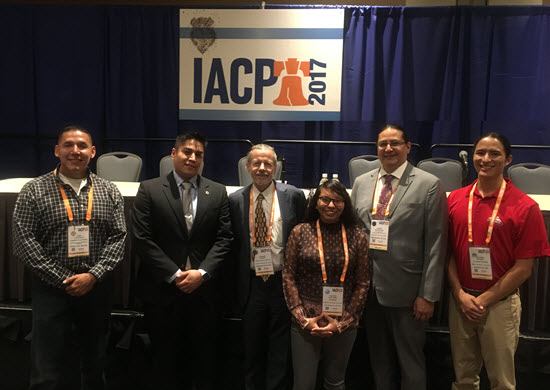NIJ is working to build capacity for research and evaluation on issues of tribal crime and justice and are engaged in various efforts to enhance our work with tribes, including support for American Indian and Alaska Native students to increase interest in criminal justice and public safety research.[1]
This year, we sponsored five American Indian or Alaskan Native students to attend the 124th Conference and Exposition of The International Association of Chiefs of Police (IACP) held in Philadelphia, Pennsylvania. Our goal was to introduce these scholars to the fields of criminal justice and public safety so they could learn how to apply their STEM education and training.
This year’s scholars represented five tribes across four states, and included three graduate and two undergraduate students. The scholars were:
- Chelsea Bad Hawk (Northern Arapaho), an undergraduate student studying at the University of Wyoming.
- Cheyenne Grabiec (Navajo), an undergraduate student at the University of Arizona.
- John Littlewolf (Bois Forte Band of Chippewa), a Ph.D. student at Antioch University.
- Joseph Robertson (Sisseton Wahpeton Oyate), a Ph.D. student at South Dakota State University.
- Vaughn Vargas (Cheyenne River Sioux), an industrial engineer studying at the Harvard Extension School.
While at the conference, the students had the opportunity to attend the NIJ Day session, the IACP’s Indian Country Law Enforcement Section meeting, and the LEADS Scholar Roundtable. Through these meetings, the scholars were able to learn about NIJ’s work, as well as the perspectives of and issues facing police chiefs from across Indian country.
The scholars also spent some time with NIJ leadership. Howard Spivak, Principal Deputy Director, National Institute of Justice noted: “This is an impressive, dynamic group of young people who will no doubt become major players in advancing the science that informs tribal programs, services, and prevention efforts in the future.”
The scholars recognized the importance of science and its application to criminal justice and public safety. Cheyenne noted that STEM is important in these fields “[b]ecause scientific research will provide evidence-based practices that could have a better effect on our communities.”
Regarding the importance of the scholarship opportunity, Joseph reflected that “[i]t’s a new effort to expose tribal scholars to the so-called main-stream knowledge base of law enforcement. As tribal entities, we are sometimes excluded from these conversations. This is an opportunity that I want to see continue and grow. There is not a negative aspect to this effort.”
This initiative is part of broader efforts by NIJ to build capacity for research and evaluation on issues of tribal crime and justice. Other activities include presentations at the conferences of the American Indian Science and Engineering Society, and the Society for the Advancement of Hispanics/Chicanos and Native Americans in Science, as well as listening sessions and intramural research to understand areas for improvement in NIJ funding and how its approach to “evidence” in science can better align with tribal perspectives.
NIJ intends to continue scholarship support for American Indian and Alaska Native students to attend various conferences and meetings in the upcoming calendar year to further honor its trust responsibility to tribal nations, and to build research capacity that will enhance public safety in tribal nations.


